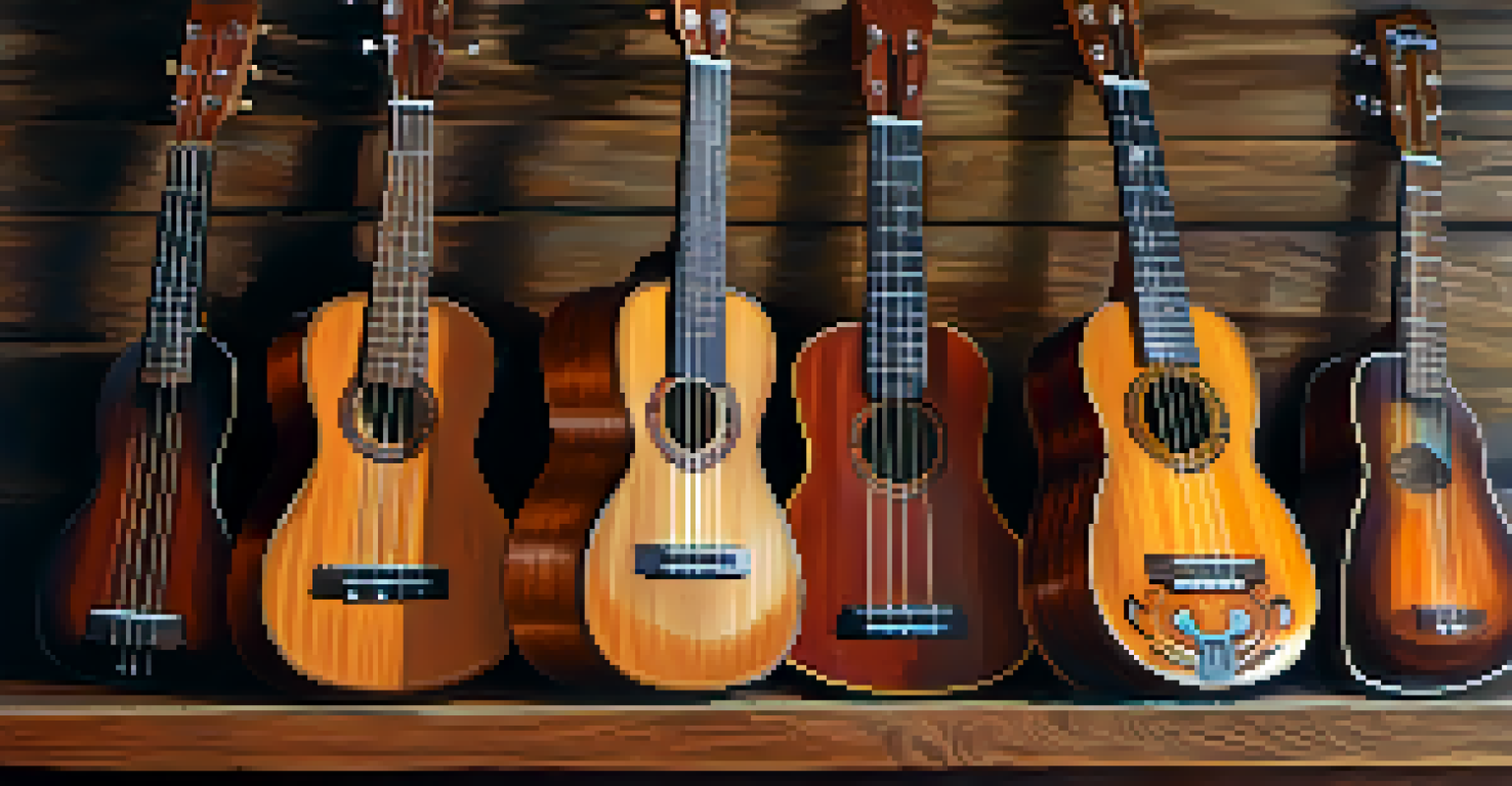Top Ukulele Picks: What to Look for When Choosing One

Understanding Ukulele Types: Soprano, Concert, and More
When choosing a ukulele, the first step is to understand the different types available. The soprano ukulele is the smallest and produces a bright, cheerful sound, making it a great choice for beginners. Concert and tenor ukuleles are larger and offer a deeper tone, which can be more satisfying for advanced players. Lastly, the baritone ukulele has the largest body and a lower pitch, providing a unique sound that stands out.
The ukulele is a perfect instrument for those who want to learn music in a fun and enjoyable way.
Each type has its own unique characteristics that cater to different playing styles and preferences. For instance, if you prioritize portability, the soprano might be your best bet. On the other hand, if you're looking for a fuller sound, you might lean towards a tenor or baritone.
Ultimately, your choice should reflect your personal style and how you intend to use the ukulele. Whether for casual strumming at the beach or more serious performances, understanding these types can guide you in selecting the right instrument.
Material Matters: Wood Types for Your Ukulele
The material of your ukulele significantly influences its tone and durability. Common woods include mahogany, koa, and spruce, each contributing distinct sounds and aesthetics. Mahogany provides warmth and depth, while koa resonates with bright, tropical tones, making it a favorite among players.

Choosing the right wood can enhance your playing experience, as the material affects how the ukulele responds to your touch. For example, spruce tops are known for their projection and clarity, which can be beneficial for performing in larger spaces.
Choose the Right Ukulele Type
Understanding the differences between soprano, concert, tenor, and baritone ukuleles helps you select the instrument that aligns with your playing style.
Additionally, consider the finish of the ukulele. A glossy finish can enhance appearance and protect the wood, while a matte finish might appeal to those who prefer a more vintage look. Balancing sound quality with visual appeal is key to finding the ukulele that speaks to you.
Size and Scale Length: Finding Your Comfort Zone
Ukuleles come in various sizes, which can affect playability and comfort. The scale length—the distance from the nut to the saddle—varies with each type of ukulele, impacting how far apart the frets are spaced. A shorter scale length typically means easier chord transitions, making it ideal for beginners.
Music is the universal language of mankind.
If you have smaller hands or are just starting out, a soprano or concert ukulele might be more comfortable. Conversely, if you have larger hands or prefer more frets to explore complex chords, a tenor or baritone could be the right choice.
Ultimately, it’s important to hold the ukulele and see how it feels. Ensuring that you can comfortably reach all the frets will make your playing experience much more enjoyable.
Sound Quality: What to Listen For When Testing
Sound quality is perhaps the most crucial aspect of choosing a ukulele. When testing different models, listen for clarity, volume, and resonance. A good ukulele should produce a rich, vibrant sound that resonates well without being overly sharp or muted.
One effective way to assess sound quality is to strum a few chords and play a melody. This will give you a sense of how well the instrument responds to your playing style. Pay attention to the sustain—the length of time the notes linger after being played—as this can indicate the overall build quality.
Consider Wood and Finish
The choice of wood and the finish of your ukulele greatly impact its tone and aesthetic, enhancing your overall playing experience.
Don’t be afraid to ask for a demo in a music store, or watch online videos to hear different models in action. Ultimately, your ears will guide you to the ukulele that feels and sounds right for you.
Budgeting for Your Ukulele: Finding Value for Money
When it comes to purchasing a ukulele, setting a budget is essential. Ukuleles can range from budget-friendly options under $100 to high-end models costing several hundred dollars. Understanding what features are most important to you can help you avoid overspending while still getting a quality instrument.
For beginners, it’s often wise to start with a mid-range ukulele that balances quality and affordability. This way, you can explore your interest without a hefty investment. As your skills progress, you can always upgrade to a more expensive model that better suits your evolving needs.
Remember, a higher price doesn’t always guarantee better sound or playability. Researching brands and reading reviews can lead you to great finds that fit your budget, ensuring you get the best value for your money.
Accessories to Consider for Your Ukulele Purchase
When investing in a ukulele, don’t forget about the accessories that can enhance your playing experience. A quality case is crucial for protecting your instrument from damage, especially if you plan to travel with it. Look for padded cases or gig bags that offer sufficient protection.
Additionally, consider purchasing a tuner to ensure your ukulele is always in tune. Clip-on tuners are user-friendly and provide quick tuning, which is especially helpful for beginners. A strap can also make playing more comfortable, especially during longer sessions.
Budget Wisely for Quality
Setting a budget ensures you find a quality ukulele that meets your needs without overspending, allowing for upgrades as your skills develop.
Lastly, a set of spare strings is a good idea, as strings can wear out over time. Having these accessories on hand will not only help you care for your ukulele but also enhance your overall playing experience.
Where to Buy: Online vs. Local Music Stores
Deciding where to buy your ukulele can be a big part of the process. Local music stores often allow you to physically test the instruments, giving you a sense of their sound and feel. Plus, you can seek advice from knowledgeable staff who can guide you based on your preferences.
On the other hand, online shopping offers convenience and a wider selection. Websites often feature customer reviews and detailed product descriptions, allowing you to compare different models easily. However, it’s crucial to purchase from reputable retailers to avoid low-quality instruments.

Ultimately, consider a hybrid approach—visit local shops to try out various ukuleles, then check online for the best prices. This way, you can ensure you’re making an informed and satisfying purchase.